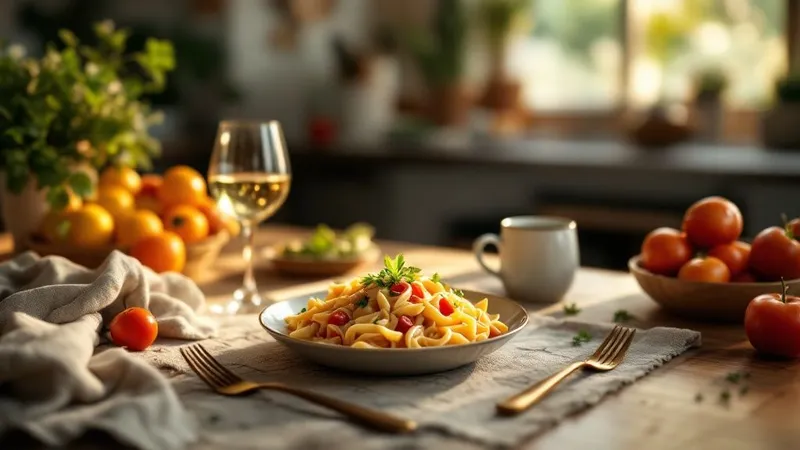
Ready to Start Your Wellness Journey?
Become a Herbalife Preferred Member and enjoy exclusive discounts of up to 25% on all products.
BECOME A PREFERRED MEMBERQuick Family Dinner Ideas: The Ultimate Guide to Stress-Free Evening Meals
The Hidden Power of Family Dinners

When families gather around the dinner table, something special happens. It's not just about the food - it's about creating meaningful connections that support everyone's wellbeing. Even quick, simple meals shared together can strengthen family bonds and positively shape children's growth and development. Making family dinners a priority, despite busy schedules, is one of the most impactful choices parents can make.
Beyond Nutrition: The Emotional Benefits
The dinner table provides a natural setting for open, honest conversations. Like a daily family meeting, it gives everyone space to share their thoughts, celebrations, and concerns. Children learn they can count on this dedicated time with their parents, which builds trust and makes tough conversations easier down the road. Parents also have endless opportunities to model good manners and healthy eating habits. When kids see mom and dad trying new foods or engaging in polite dinner conversation, they're more likely to adopt these positive behaviors themselves.
Academic Advantages and Reduced Risks
Family meals do more than nourish bodies and relationships - they can boost academic success too. Research shows that kids who regularly eat with their families tend to do better in school, likely because dinner conversations help develop vocabulary and communication skills. These shared meals also protect teens from risky behaviors by giving them a strong sense of connection and support at home. Simply put, making time for family dinner helps set kids up for better outcomes both now and in the future.
Tackling the "Too Busy" Hurdle
Between work, school, activities and other commitments, finding time for family dinner can feel impossible. The good news? Even 20 minutes of focused family time around simple meals can make a difference. Start with easy recipes that come together quickly - sheet pan dinners, slow cooker meals, or breakfast for dinner. Prep ingredients on weekends or keep nutritious pantry staples on hand. With some basic planning, regular family dinners become much more manageable.
Creating Lasting Memories
While quick weeknight dinners may not seem memorable in the moment, they add up to something powerful over time. Small traditions make even simple meals special - try themed dinners, let kids help plan menus, or share highlights from everyone's day. These consistent, shared experiences create an anchor of stability and belonging that family members carry with them. That's the true magic of family dinner - turning everyday meals into meaningful memories that strengthen relationships for years to come.
Smart Kitchen Strategies That Actually Work
Making regular family dinners happen consistently takes more than good intentions. Busy families need practical solutions that fit their real-world schedules and constraints. Let's explore how to create a kitchen system that delivers delicious meals without adding stress to your day.
Mastering Meal Planning
The daily "What's for dinner?" question can derail even the best dinner plans. A solid meal plan acts like your weekly dinner guide, preventing those frantic last-minute trips to the grocery store. Try organizing meals around fun themes - "Meatless Monday" or "Taco Tuesday" not only makes planning simpler but gets the whole family excited about dinner time. Keep your plan realistic by building in some wiggle room. Having a few backup meals ready to go means schedule changes won't throw off your entire week.
Organizing Your Kitchen Arsenal
Think of your kitchen like a professional chef's workspace - everything needs a logical home for maximum efficiency. Group similar items together in your pantry and cabinets so you can find what you need quickly. Keep your most-used tools and ingredients within easy reach. Good storage containers are worth the investment too - they help ingredients stay fresh longer and make it easy to see what you have on hand. When your kitchen is well-organized, putting together dinner becomes much more manageable.
Technology as Your Ally
The right tech tools can make dinner prep much easier, but the key is choosing ones that truly save you time. Online grocery ordering through services like Instacart or Walmart Grocery lets you shop from anywhere, freeing up hours in your week. Recipe apps like Paprika or Mealime help organize your meal planning and shopping lists in one place. These tools mean less time planning and more time enjoying meals with your family.
Embrace the Power of Prep
A little advance prep work makes weeknight cooking much smoother. You don't need to spend your whole weekend meal prepping - even an hour or two of chopping vegetables, marinating proteins, or portioning snacks can make a big difference. Think of it as setting yourself up for success. When dinner time rolls around, you'll have the tedious prep work done and can focus on actually cooking and spending time with your family. Simple strategies like these help make family dinners a regular, stress-free part of your day.
Remember, the goal isn't perfection - it's finding practical ways to get good food on the table consistently. Start with one or two of these strategies and build from there as they become habits. Soon you'll have a system that works for your unique family situation.
Quick-Win Recipes That Never Fail

Family dinners matter, but let's be real - between work, school, and activities, finding time to cook elaborate meals isn't always possible. That's why having a collection of quick, reliable dinner recipes is essential for making regular family meals happen. Here are some practical ways to get wholesome dinners on the table in 30 minutes or less.
Versatile Meal Templates: Your Secret Weapon
Skip the complex recipes and focus on mastering a few flexible meal formulas you can adapt again and again. Take sheet pan dinners, for instance - they're incredibly adaptable. Just pick your protein (chicken, sausage, tofu), add whatever veggies you have on hand, season well, and roast until done. Clean-up is minimal since everything cooks on one pan.
Build-your-own grain bowls are another winner. Start with cooked rice or quinoa as your base, then let everyone add their choice of protein, roasted veggies, and sauce. This approach gives family members control over their meal while keeping prep simple. When everyone can customize their plate, dinner becomes more enjoyable for all.
Clever Ingredient Swaps: Maximize Nutrition Without the Fuss
Getting the whole family excited about healthy eating can be tricky. The key is making small, smart swaps that pack in nutrition without sacrificing flavor. Try swapping in cauliflower rice for regular rice to add more vegetables, or use ground turkey instead of beef in family favorites like tacos and pasta sauce. These simple changes make meals healthier while keeping them delicious and satisfying.
The Art of Planned-Overs: Stretch Your Meals Further
Smart meal planning goes beyond just tonight's dinner. Learn to turn leftovers (or "planned-overs") into completely different meals to save time and reduce waste. That roast chicken from Monday? It becomes Tuesday's chicken salad sandwiches or tops Wednesday's garden salad. One cooking session provides multiple meals, freeing up precious time during busy weeknights.
Maintaining Quality While Maximizing Efficiency
Quick doesn't mean cutting corners on quality. Three simple strategies help ensure fast family dinners stay delicious and nutritious. First, buy good ingredients - fresh produce, quality proteins, and whole grains make every dish better. Second, watch your cooking times carefully to avoid dry, overcooked food. Third, keep a well-stocked spice cabinet to bring out the natural flavors in your ingredients. With these basics covered, you can serve up quick, healthy meals your family will actually want to eat.
The Make-Ahead Revolution
The secret to stress-free weeknight dinners lies in smart preparation. While having quick recipes on hand helps, taking meal prep to the next level can transform your entire week. By preparing key ingredients in advance, you create a flexible foundation for multiple meals rather than just cooking larger portions of single dishes.
Mastering the Art of Batch Cooking
The key to effective batch cooking is focusing on versatile ingredients that work in different dishes. When you roast a pan of chicken breasts on Sunday, those pieces can become Monday's taco filling, Tuesday's salad topper, or Wednesday's grain bowl protein. Similarly, cooking a large batch of quinoa gives you a ready-to-use base for several meals. This approach means you spend less time cooking each evening and more time enjoying dinner with your family.
Freezer-Friendly Foods: Your Secret Weapon
A well-stocked freezer can save dinner on busy nights. Many foods freeze perfectly - from hearty soups and stews to flavorful sauces. When you portion cooked grains, beans, and roasted vegetables into freezer containers, you're essentially creating your own healthy "convenience food." On hectic evenings, you can pull out exactly what you need to create a balanced meal in minutes.
Strategic Storage Solutions for Optimal Freshness
Good storage practices keep your prepped ingredients fresh and ready to use. Clear, airtight containers protect food quality and make it easy to see what you have on hand. Always mark containers with dates to track freshness. Keeping prepped ingredients separate - like storing chopped vegetables in individual containers - makes it simple to grab exactly what you need for each meal without disturbing other items.
Meal Variety: Avoiding the Monotony Trap
Some worry that meal prep means eating the same things repeatedly, but thoughtful planning prevents boredom. Basic prepped ingredients can create entirely different meals through creative combinations and flavor variations. That batch of roasted vegetables could become part of an Asian stir-fry one night and a Mediterranean grain bowl the next. The trick is having a few reliable sauce recipes and seasoning combinations ready to transform your base ingredients. Planning your weekly menu around prepped items helps you use everything efficiently while keeping meals interesting. When done right, this approach saves time without sacrificing the joy of trying new flavors and combinations that everyone at the table will enjoy.
Building Meaningful Connections Over Quick Meals

Fast-paced family life often means quick meals, but that doesn't mean sacrificing quality time together. By making small but intentional changes, you can turn everyday dinners into opportunities for real connection and memory-making. The key is shifting focus from just getting food on the table to creating an environment where everyone feels heard and valued.
Fostering Engaging Conversation
Good conversation makes family dinner special, but it takes more than just sitting at the same table. Create the right setting by making mealtime a phone-free zone where everyone can focus on each other without digital distractions. Start conversations flowing with simple questions like "What made you smile today?" or "What's something new you learned?" These easy conversation starters often lead to deeper sharing and help family members stay connected to each other's daily lives.
Catering to Different Age Groups
Every family member has different needs and interests when it comes to dinner conversation. Young kids might love playing word games or sharing funny stories, while teenagers may prefer discussing their favorite music or talking about what's happening at school. Pay attention to what engages each person and mix up activities accordingly. When everyone has a way to participate that feels natural to them, family dinner becomes something to look forward to rather than just another daily task.
Creating Traditions That Stick
Simple rituals can make even quick weeknight dinners feel special. Try starting each meal by sharing one thing you're grateful for, letting family members take turns picking dinner music, or lighting a candle to signal the start of family time. Getting kids involved in meal planning or simple food prep tasks helps them feel ownership over family dinner and builds excitement. These small but consistent practices help create a sense of belonging that strengthens family bonds.
Navigating Dinnertime Challenges
Every family faces mealtime hurdles, from picky eating to the pull of phones and tablets. Handle these challenges with a positive approach - offer food choices within healthy boundaries without turning dinner into a battle, and set clear technology rules that everyone understands and follows. When everyone knows what to expect, it's easier to focus on enjoying time together. Remember that the goal isn't perfect meals - it's creating regular opportunities for your family to connect, share, and grow closer over simple everyday moments around the dinner table.
Overcoming Real-World Dinner Challenges

Let's be honest - family dinners rarely go according to plan. Even with careful meal planning and prep work, real-life challenges like busy schedules, food preferences, and unexpected changes can quickly derail our best intentions. But with some practical strategies and a flexible mindset, you can still create consistent, enjoyable family meals that bring everyone together, despite the daily chaos.
Taming the Scheduling Beast
Between soccer practice, work meetings, and music lessons, finding a time when everyone can sit down together can feel impossible. But families who prioritize shared meals treat dinner like any other important commitment. They block out specific times on the family calendar and protect those slots. When conflicts arise, they get creative - maybe moving Friday's dinner to Saturday lunch if practice runs late. The secret is finding a rhythm that fits your family's unique schedule and sticking to it as much as possible while allowing room for adjustments when needed.
Navigating Dietary Needs and Preferences
When one child is vegetarian, another can't eat gluten, and a third refuses anything green, meal planning becomes extra challenging. But turning dinner into a fight helps no one. A better approach is creating flexible "build-your-own" meals where everyone can customize their plate. Taco bars, rice bowl stations, or make-your-own pizza nights let each person choose their ingredients while still sharing the experience together. This simple shift can dramatically reduce mealtime tension while ensuring everyone's needs are met.
Getting Everyone Involved
Making dinner a team effort changes it from a chore into quality family time. Give kids age-appropriate tasks that let them contribute meaningfully - younger ones can set the table or tear lettuce while older kids help chop vegetables or make simple sides. This not only distributes the work but also teaches valuable kitchen skills. The same goes for cleanup - when everyone pitches in, it reinforces that family meals are a shared responsibility that benefits everyone.
Staying Consistent During Busy Seasons
During especially hectic periods, family dinners might seem like too much effort. Yet these are often the times when sharing meals matters most, providing an anchor of connection amid the chaos. Smart strategies like batch cooking on weekends, keeping quick meals in the freezer, and relying on simple recipes can help maintain the dinner routine even when time is tight. Remember that a basic meal eaten together still nurtures family bonds - it doesn't need to be fancy to be meaningful.
Ready to Start Your Wellness Journey?
Become a Herbalife Preferred Member and enjoy exclusive discounts of up to 25% on all products.
BECOME A PREFERRED MEMBER